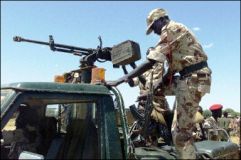Militia groups threaten new-found peace in southern Sudan
OLD FANGAK, Sudan, April 8 (AFP) — Militia groups in southern Sudan are threatening to wreck a fragile peace that has emerged nearly three months after Khartoum and the region’s main rebel force inked a deal to end 21 years of war, residents and aid workers said Friday.

|
|
Repel from SPLA embarking on a car with a machine gun. (file/AFP). |
About 30 such groups, unaffected by the January 9 peace deal signed by Khartoum and the Sudan People’s Liberation Movement/Army (SPLM/A), continue to terrorize Upper Nile state, attacking villages here, collecting illegal taxes and abducting locals, they said.
“Peace has been signed, but the presence of militiamen disturbs us,” said John Kuol Nhial, who was tortured by the fighters in 2001 as they battled the SPLA for control of this town on the River Zerati, a main tributary of the White Nile.
“They are a threat,” he told reporters in Old Fangak, opening his mouth to reveal missing teeth that he said were removed by the militia during the struggle in which two of his three children were killed and the other fled.
“These are very dangerous people, they can eliminate you,” said Father Antonio Labraca, an Italian missionary who has lived in Sudan for 20 years working on educational and development projects.
Under the Khartoum-SPLM/A peace accord, the two sides have a year from the signing day to integrate southern Sudan’s militia into their respective armies and organizations but there are fears the move will fuel inter-clan conflicts in the south.
Already, there has been resistance.
In February, gunmen loyal to militia commander Gabriel Tanginya briefly evicted the SPLM/A from Akobo town, a dusty outpost near the Ethiopian border, but were then routed leaving behind scores of dead and wounded and horrific destruction.
And residents say militia checkpoints where transportation taxes are demanded dot the 120-kilometer (75-mile) stretch of cratered road between Old Fangak and the government garrison town of Malakal.
As there are few vehicles, the roadblocks make the already difficult trip — a three-day walk usually with livestock to pay for goods, medical services and bribes — even more treacherous.
The checkpoints also compound problems stemming from far worse militia activity: the abductions and conscription into their ranks of villagers who are forced to serve as fighters, porters and human shields.
“Others are lured in with promises of mosquito nets and blankets,” said Peter Nut, a middle-aged Nuer herder who explained that people were susceptible to such tricks due to the dangers posed by malaria.
As he spoke with visible fear of the militia, others nodded gravely in agreement.
“They use the captives as human shields should somebody attack militia positions,” said Labraca the missionary, adding that even if the hostages are rescued they often remain isolated from their families.
Several Old Fangak residents said their wives and children were abducted by the militia in 2001 and, though later freed, refuse to return home from the relative safety of Malakal fearing they will be recaptured en route.
“They are scared to come back,” said Peter Ruai, who has not seen his wife and child for the past four years and has communicated with them only through letters delivered by the International Committee for the Red Cross.
Klaus Stieglitz, a human rights worker with the German charity Sign of Hope that does work in Old Fangak and other areas of southern Sudan said the continued presence of the militia here amounted to abuse.
“Restricting freedom of movement by imposing fear amounts to violation of human rights,” he said. “Something should be done about the militia if the implementation of the peace deal is to be effective.”
However, retired Kenyan army general Lazaro Sumbeiywo, who mediated the north-south peace negotiations, urged patience in nurturing the agreement, arguing that an end to militia activity in southern Sudan, like other elements of the accord, would require hard work.
“It is like a baby, you have to nurture him until he grows and behaves well,” he told AFP.
